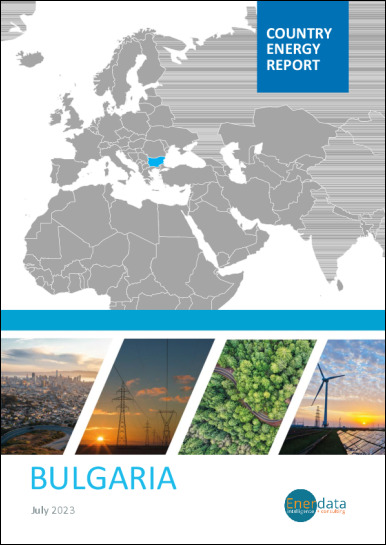- Update
-
- Format
- 4 files (PDF report, 3 Excel files)
- Pages
-
44 (Report only)
- Delivery
- Immediate by e-mail
- GENERAL OVERVIEW
- INSTITUTIONS AND ENERGY POLICY
- ENERGY COMPANIES
- ENERGY SUPPLY
- ENERGY PRICES
- ENERGY CONSUMPTION
- ISSUES AND PROSPECTS
- DATA TABLES
- ABBREVIATIONS
- GLOSSARY
Buy Bulgaria energy report
Price without VAT. Depending on your statute and location, VAT might be applicable. Get in touch with us for more information.
After validation, you will immediately receive 4 files by email (one pdf report and 3 excel files containing the datasets).
Overview
This analysis includes a comprehensive Bulgaria energy market report and updated datasets. It is derived from the most recent key economic indicators, supply and demand factors, oil and gas pricing trends and major energy issues and developments surrounding the energy industry. The report provides a complete picture of the country situation, dynamics, current issues and future prospects. With market data and continuous follow-up of markets news, this report brings clear and concise insights with which to tackle national energy challenges and opportunities. Browse the tabs below for a detailed table of contents, the list of graphs and tables, and details on the data files.
Highlights
- The electricity and gas market liberalisation remains limited.
- In 2024, two tenders were launched to procure 1.4 GW of wind and solar and 350 MW of storage.
- Bulgarian Energy Holding (BEH) accounts for around half of power generation, 90% of wholesale gas sales, and more than 90% of lignite mining.
- Electricity distribution is ensured by 3 foreign companies.
- Lignite-fired power generation was halved in 2023 due to high CO2 prices, pollution constraints, and the competition of renewables.
- CO2-free sources accounted for 69% of the power mix in 2023.
- Bulgaria is replacing Russian gas supplies that were interrupted in April 2022.
- Electricity and gas prices declined in 2023 after a surge in 2021 and 2022. They are 40% to 60% lower than the EU average.
- Coal and lignite consumption halved in 2023, cutting primary energy consumption by 11%.
- Bulgaria is accelerating its Kozloduy-7 nuclear project.
- Many regional gas interconnection projects are under development, as Bulgaria aims to become a regional gas hub.
Institutions & Energy Policy
The Ministry of Energy oversees the country's energy policy. The Energy and Water Regulatory Commission (EWRC) regulates the energy sector, including some energy prices (gas, electricity, water, and district heating). It also approves the construction of gas and oil pipelines.
Energy Companies
Electricity:
In 2008, the five large public energy companies - historical operators of the electricity sector, gas and coal companies - were grouped under BEH, Bulgarian Energy Holding.
Energy Supply
Gas:
Natural gas production is negligible (around 10 mcm) and accounts for less than 1% of the domestic supply (2023). Imports have averaged 3 bcm/year since 2010 (-17% to 2.4 bcm in 2023 after a peak of 3.3 bcm in 2021).
Energy Prices
Electricity:
Electricity prices have increased noticeably since 2020, in line with European wholesale prices in 2021 (due to surging gas prices, high CO2 prices, the economic recovery, a cold winter followed by a hot summer, low nuclear availability in France and Germany) and in 2022 (gas supply tensions).
Energy Consumption
Consumption per capita is 2.7 toe (4% lower than the EU average in 2023), with electricity accounting for about 5 000 kWh in 2023 (7% below the EU average in 2023).
Total energy consumption fell by 11% to 17 Mtoe in 2023, in a context of lower lignite-fired power generation and higher electricity imports, after strong growth in 2021 (8.7%) and a slow progression in 2022 (+1.2%).
Issues & Prospects
Gas:
According to Bulgartransgaz, gas consumption should increase by over 10%/year between 2024 and 2033. Most of the additional demand would be covered by imports.
 Energy and Climate Databases
Energy and Climate Databases Market Analysis
Market Analysis